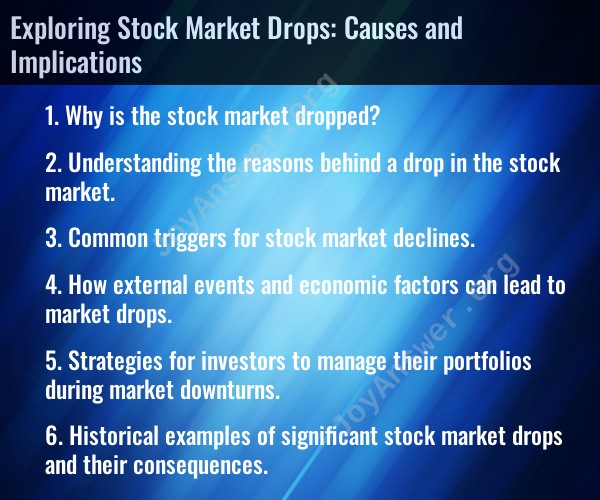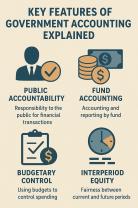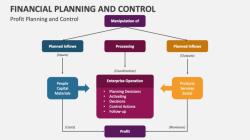Why is the stock market dropped?
The stock market can drop for various reasons, and it's important to note that it's a complex system influenced by multiple factors. Here are some common causes of stock market drops and their implications:
Economic Uncertainty:
- Economic uncertainty, such as a recession, can lead to a drop in the stock market. Economic downturns can result from various factors, including a decline in consumer spending, rising unemployment, or a decrease in business investment.
Geopolitical Events:
- Geopolitical events like wars, trade tensions, or political instability can create uncertainty in the financial markets, leading to stock market declines. Investors may become cautious due to the unpredictable nature of these events.
Corporate Earnings Reports:
- When companies report lower-than-expected earnings or revenue, it can lead to a drop in their stock prices. Negative surprises in earnings reports can trigger selling by investors.
Interest Rates:
- An increase in interest rates by central banks can make bonds and other fixed-income investments more attractive relative to stocks. This can lead to a shift of investment capital out of the stock market, causing prices to drop.
Global Economic Events:
- Events like a global financial crisis, a major recession in a major economy, or a significant currency devaluation can have widespread impacts on stock markets around the world.
Natural Disasters and Pandemics:
- Events such as natural disasters, health crises like pandemics, or environmental catastrophes can disrupt economic activity, leading to market declines.
Market Sentiment:
- Market sentiment and investor psychology play a significant role in stock market movements. Fear, uncertainty, and panic selling can lead to steep declines, while optimism and confidence can drive market gains.
Speculative Bubbles Bursting:
- When assets, such as technology stocks or real estate, are in a speculative bubble and that bubble bursts, it can result in significant stock market drops.
Liquidity Issues:
- Lack of liquidity in the financial markets, such as during a credit crunch or financial crisis, can lead to stock market declines. When investors are unable to buy or sell assets easily, it can create volatility.
Implications of Stock Market Drops:
Wealth Erosion: A stock market drop can lead to a decline in the value of investors' portfolios, impacting their wealth and financial security.
Reduced Consumer Confidence: A falling stock market can erode consumer confidence, potentially leading to decreased consumer spending, which can affect the broader economy.
Investor Sentiment: Negative stock market movements can influence investor sentiment, potentially leading to a bear market (prolonged decline) or a market correction (a short-term decline).
Corporate Performance: Companies may face challenges in raising capital and may cut back on investments or hiring during periods of stock market decline.
Financial Institutions: Financial institutions that have significant exposure to stock market assets may face financial stress during market downturns.
Retirement Accounts: Stock market declines can affect retirement accounts, impacting the financial well-being of individuals saving for retirement.
It's important to understand that stock market drops are a natural part of the market's cyclical behavior. While they can be concerning, they do not necessarily indicate a long-term negative outlook. Investors often use diversification, risk management strategies, and a long-term perspective to navigate the ups and downs of the stock market. Additionally, consulting with a financial advisor can help individuals make informed decisions during market volatility.
Understanding the reasons behind a drop in the stock market
The stock market is a complex system that is influenced by a variety of factors. When these factors combine in a negative way, it can lead to a drop in the stock market.
Common triggers for stock market declines
Some common triggers for stock market declines include:
- Economic recessions: When the economy is in a recession, businesses are less profitable and investors are less likely to buy stocks.
- Interest rate hikes: When the Federal Reserve raises interest rates, it becomes more expensive for businesses to borrow money and invest. This can lead to lower earnings and stock prices.
- Geopolitical events: Wars, terrorist attacks, and other geopolitical events can lead to uncertainty and risk aversion in the markets. This can lead to a sell-off of stocks.
- Regulatory changes: Changes in government regulations can also lead to uncertainty and risk aversion in the markets. This can lead to a sell-off of stocks.
- Investor sentiment: Investor sentiment can also play a role in stock market declines. If investors become pessimistic about the future of the economy or the stock market, they may sell their stocks.
How external events and economic factors can lead to market drops
External events and economic factors can lead to market drops in a number of ways. For example, a recession can lead to lower earnings for businesses, which can lead to lower stock prices. Interest rate hikes can make it more expensive for businesses to borrow money and invest, which can also lead to lower earnings and stock prices. Geopolitical events and regulatory changes can lead to uncertainty and risk aversion in the markets, which can lead to a sell-off of stocks.
Strategies for investors to manage their portfolios during market downturns
There are a number of strategies that investors can use to manage their portfolios during market downturns. Some common strategies include:
- Rebalancing their portfolios: Investors can rebalance their portfolios to reduce their exposure to riskier assets, such as stocks.
- Investing in defensive sectors: Investors can invest in defensive sectors, such as consumer staples and utilities, which are less likely to be affected by a market downturn.
- Dollar-cost averaging: Investors can dollar-cost average, which involves investing a fixed amount of money at regular intervals, regardless of the price of the stock. This can help to reduce the average cost per share and mitigate the effects of market volatility.
- Hedging their portfolios: Investors can hedge their portfolios using options or other derivatives. This can help to reduce risk and protect against losses.
Historical examples of significant stock market drops and their consequences
There have been a number of significant stock market drops throughout history. Some of the most notable examples include:
- The Wall Street Crash of 1929: The stock market crashed in October 1929, which led to the Great Depression. The Dow Jones Industrial Average fell by more than 80% during this period.
- The Black Monday Crash of 1987: The Dow Jones Industrial Average fell by more than 22% on October 19, 1987, which was the largest single-day percentage decline in history.
- The Dot-com Crash of 2000: The stock market crashed in 2000, which was largely due to the collapse of the dot-com bubble. The Nasdaq Composite Index fell by more than 70% during this period.
- The Financial Crisis of 2008: The stock market crashed in 2008, which was largely due to the collapse of the subprime mortgage market. The Dow Jones Industrial Average fell by more than 50% during this period.
Each of these stock market drops had a significant impact on the global economy. The Crash of 1929 led to the Great Depression, which was the worst economic downturn in modern history. The Dot-com Crash and the Financial Crisis of 2008 also had a significant impact on the global economy, leading to recessions and job losses.
Conclusion
The stock market is a complex system that is influenced by a variety of factors. When these factors combine in a negative way, it can lead to a drop in the stock market. Investors can use a number of strategies to manage their portfolios during market downturns.













